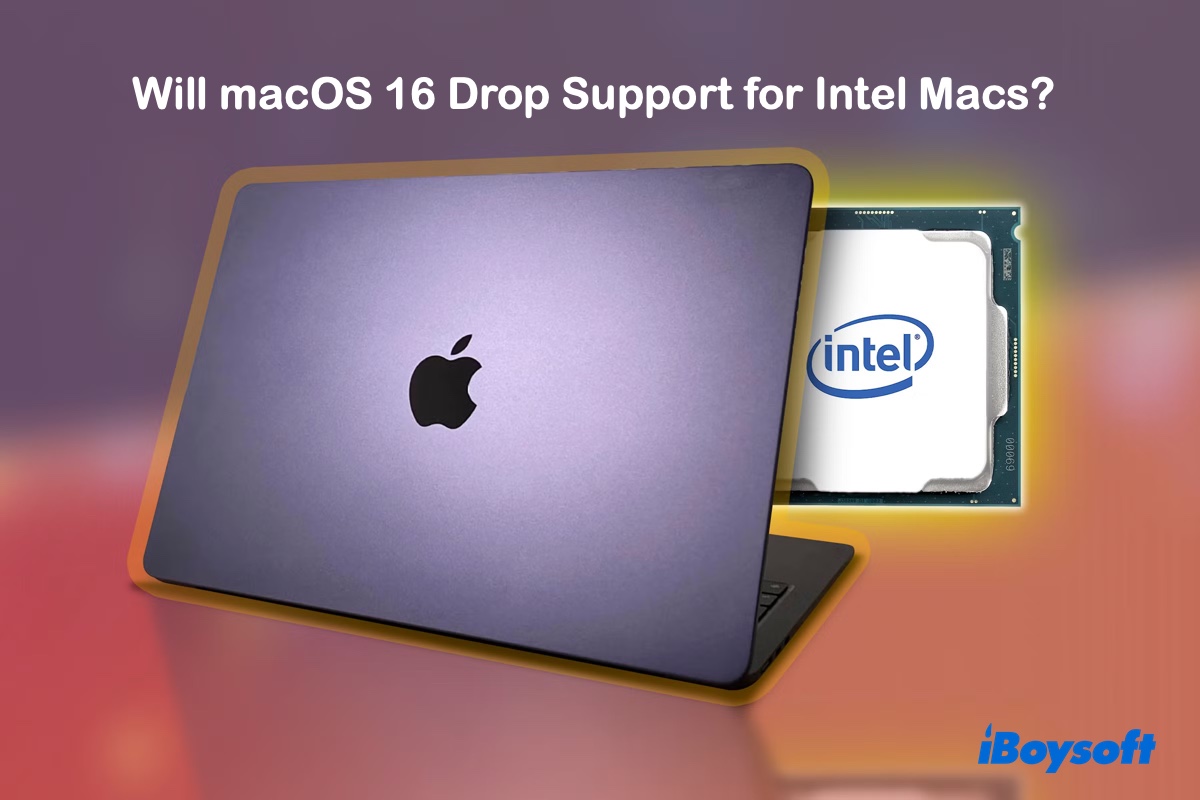Note: As predicted, macOS 26 (Apple decided to identify its new macOS by year (2026) rather than version number (16) continues to support a few Intel-based Mac models. Read more in this guide: macOS 26 Tahoe Supported Devices
Apple announced its plan to switch from Intel processors to Apple Silicon in 2020 and completed the transition three years later. Ever since the announcement, Apple has accelerated its pace to drop support for Intel Macs. This leaves many Intel Mac owners wondering, "How long will Intel Macs be supported?" The Reddit post below is one.
macOS 16 is going to drop support for all Intel Macs
by u/HdihufWasTakenIsBack in mac
Since Apple hasn't made an official statement about when it plans to end Intel Mac support, every new macOS version may be the last update for Intel Macs. macOS 15 Sequoia witnessed the dropout of 2018 and 2019 MacBook Airs, but remained support for other Intel Mac models compatible with macOS 14 Sonoma.
What's this year like? Will macOS 16 drop support for all Intel Macs? In this article, we'll lay out three possible scenarios for Intel support on macOS 16.
Scenario 1: macOS 16 will support some of the Intel Macs
The prevailing idea is that macOS 16 will likely drop support for some Intel Mac models compatible with macOS 15 Sequoia but keep the rest supported.
According to arstechnica.com, Macs usually receive a minimum of 5 or 6 years of macOS updates with new features. If Apple were to withdraw all Intel support in macOS 16, many models would get less than the average year of updates, such as the late 2019 model, the early 2020 Mac model, and especially those sold in late 2023.
Therefore, it's reasonable for Apple to keep them for one more year to meet the baseline of macOS software update support.
Moreover, the termination of Intel support is big news. Apple should at least give the developers some advance warning, like it did with the end of 32-bit Intel apps in macOS Catalina and the discontinuation of legacy kernel extensions in macOS Big Sur.
Scenario 2: macOS 16 will drop support for all Intel Macs
Apple Silicon is the future. While there are some less important features exclusive to Apple Silicon Macs on previous releases, macOS Sequoia ceased support for its headline feature, Apple Intelligence, and many others, suggesting that the clock is ticking for Intel support.
Besides, the remaining Intel Mac models supported by macOS 15 Sequoia are very close to the Apple Silicon transition.
- Mac mini (2018)
- iMac (2019, 2020)
- iMac Pro (2017)
- MacBook Air (2020)
- MacBook Pro (2018, 2019, 2020)
- Mac Pro (2019)
If Apple drops Intel support in macOS 16, it leaves the last wave of Intel Macs about 5 years' worth of system updates, which seems relatively generous compared to the transition from PowerPC to Intel Mac.
Apple's eagerness to leave Intel Mac behind is also reflected in its most recent app, Apple Immersive Video Utility, which is only available to Apple Silicon Macs.
Thus, it's possible that macOS 16 will stop supporting all Intel Macs.
Scenario 3: macOS 16 will support the same Mac model as macOS 15
macOS 16 may also maintain the same Intel Macs as in macOS 15.
The last few generations of Intel Macs have similar CPUs and GPUs. If Apple decides to support late 2019 and 2020 Macs, keeping 2018 or early 2019 Macs shouldn't be too much of a hassle.
The Intel support will probably end with macOS 17, leaving macOS 16 the last version of macOS to run on Intel Macs.
Conclusion
The discussion about whether macOS 16 will drop support for Intel Macs won't have an answer until Apple reveals the supported devices of macOS 16 at this year's WWDC. The event will start on June 9, 2025. Let's look forward to it together!
